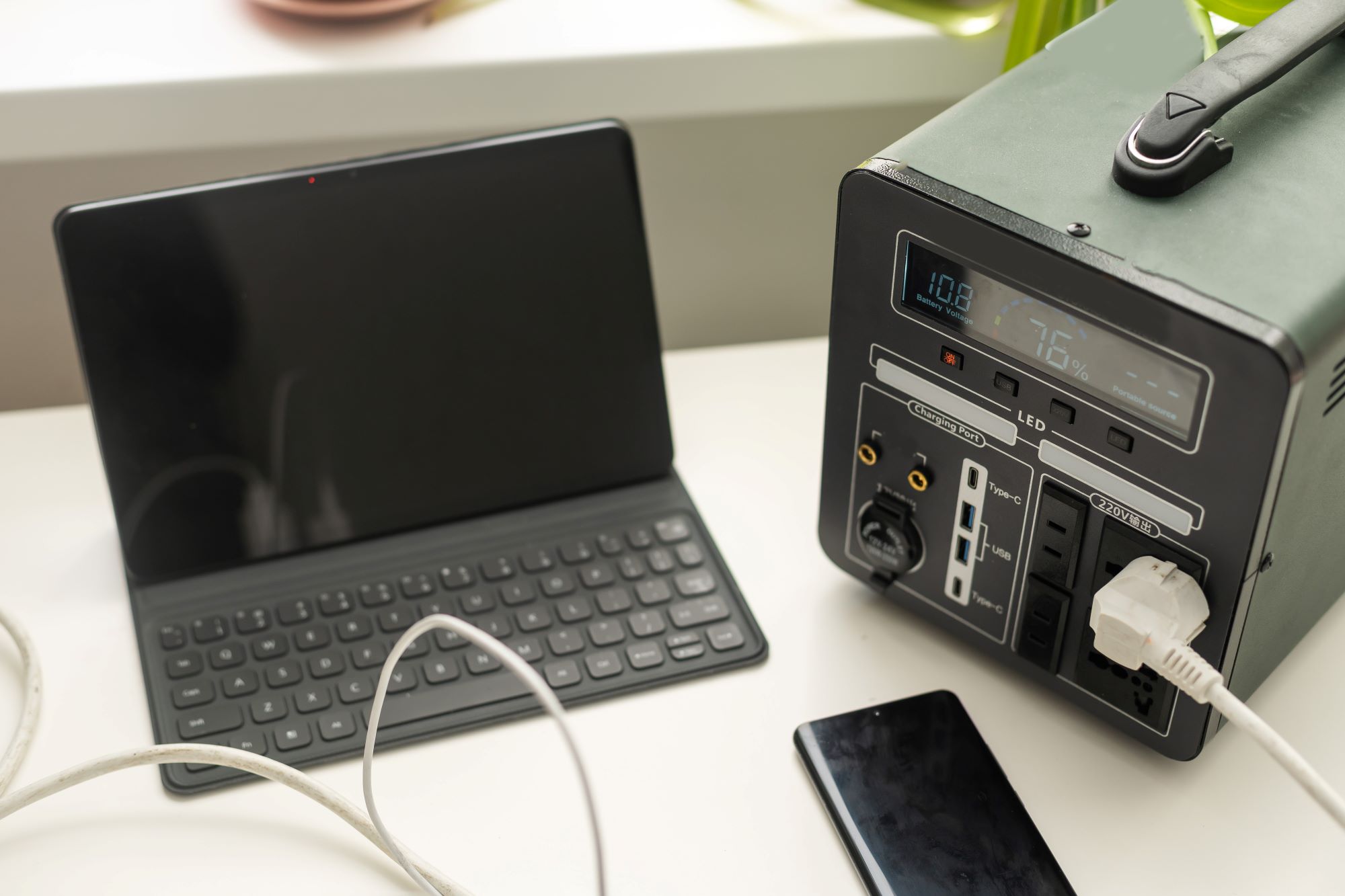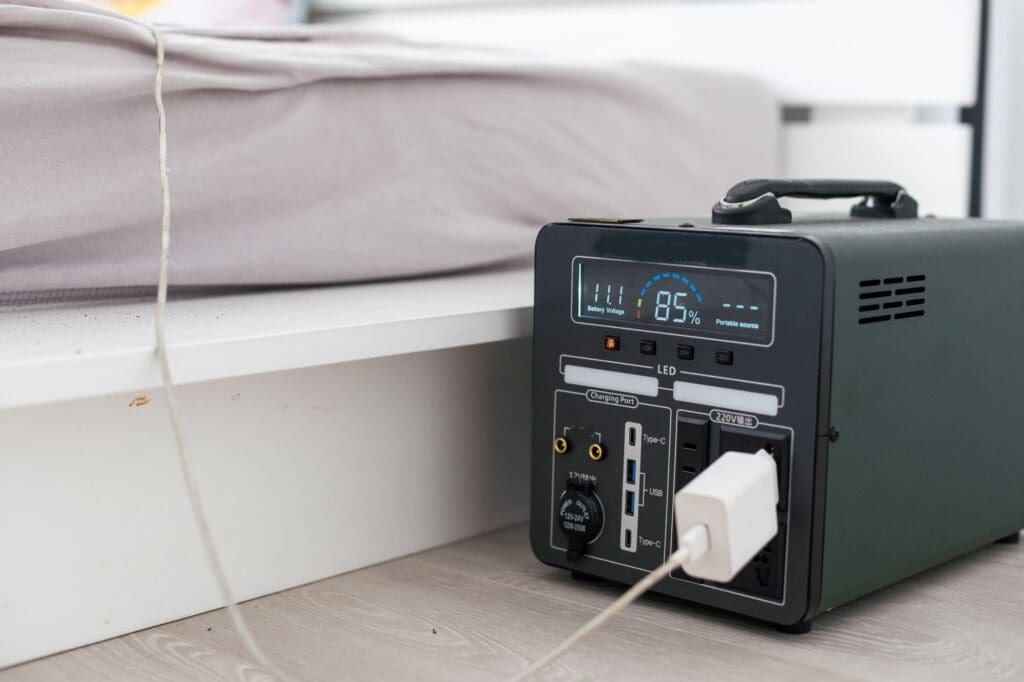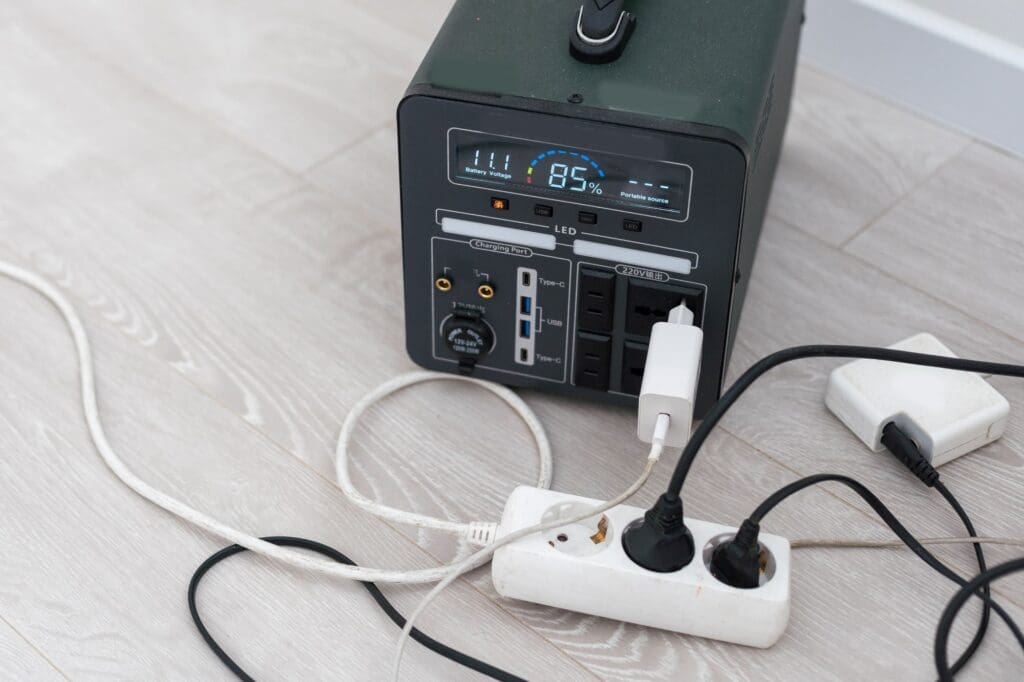
Portable Solar Power Generators: Jackery Solar Generator 2000 Pro 200W vs. EF ECOFLOW Solar Generator DELTA Max+220W
Disclosure: This website uses affiliate links, which may earn a commission at no additional cost to you. As an Amazon Associate, I earn from qualifying purchases.
Since moving upcountry, I have always hoped I would get myself a portable solar power station. But have you seen the price tag on those things? And I am not talking about an entry-level item.
I live completely off-grid, which is as charming as it can be since I don’t have to deal with regular power outages and high power bills. Because of this and the high price tag of portable solar power generators, I have shelved that purchase for months on end, mostly waiting for discounts.
But my situation, living completely off-grid, is not without challenges. Our off-grid system can sometimes be unreliable, considering it’s powering two households. This is more common during the rainy season when it rains heavily, and the days are usually very cloudy.
Of course, upgrading the system or considering getting on the local grid is an option. But that’s the job of the property owner.
The last few weeks have reignited my need for a solar power station. And my love for travel and possible road trips in the near future have only amplified the need for a portable power solution that allows me to power my electronics and still work on the road. Let’s not forget that it’s Black Friday season, and the Holiday Season is also around the corner. So, sale discounts will be streaming in!
I have spent the last few days pouring over reviews, searching for a reliable portable solar power station that suits my needs. At the top of the list is, of course, tapping into solar energy to charge the power station. Due to the discounts, I also hoped I could afford one with expandable capabilities. This will allow me to expand the generator’s output with additional batteries. Next on the list is the generator’s capacity, including the number of charging outlets.
So far, I have narrowed my search to 2 options: Jackery Solar Generator 2000 Pro 200W vs EF ECOFLOW Solar Generator DELTA Max+220W.
Before I get into a detailed review of these two, let’s talk a bit about the advantages of solar-powered power stations and how you can choose the right one for your needs.

The Benefits of Portable Solar Power Generators
Portable solar-powered power generators offer a number of benefits over traditional fuel-powered generators. These include:
Clean Energy
Harnessing the sun’s energy, these generators operate using renewable solar power. They generate electricity without emitting harmful pollutants, reducing the carbon footprint and contributing to a cleaner environment.
This eco-friendly aspect aligns with sustainability goals, promoting a greener lifestyle and reducing reliance on fossil fuels.
Portability
Portable solar-powered generators are designed for mobility, offering a convenient power source wherever you go. Their compact and lightweight nature allows for easy transportation, making them ideal for road trips, camping, off-grid living, and emergency situations.
Unlike traditional generators, they don’t require heavy fuel tanks, making them more manageable for individuals or families on the move.
Versatility
Portable solar generators have different power capacities, allowing them to power a wide range of devices. From small electronics like phones, tablets, and laptops to larger appliances such as refrigerators, lights, and even power tools, these generators offer versatility in accommodating various power needs.
Reliability in Diverse Weather Conditions
Despite concerns about inclement weather affecting solar power generation, modern portable generators are equipped to handle various weather conditions. They can charge even on overcast days, albeit at a slightly reduced efficiency.
This adaptability ensures a consistent power supply, which is crucial for maintaining essential devices during cloudy or rainy periods.

Quiet Operation
Compared to traditional gas-powered generators that produce noise pollution, portable solar generators operate silently.
This quietness is beneficial, especially in serene environments such as campsites, off-grid homes, or during power outages in residential areas. It ensures a peaceful atmosphere without disturbing wildlife or neighbors.
Emergency Backup
During emergencies or natural disasters when conventional power sources may fail, these generators serve as reliable backup power sources.
Portable solar-powered power stations provide a lifeline for communication, powering essential medical devices, maintaining food refrigeration, and ensuring a semblance of normalcy during crises.
Cost Efficiency Over Time
Though the initial investment is quite significant, portable solar generators offer cost savings in the long run. They operate using free solar energy, eliminating the ongoing fuel expense for traditional generators.
Moreover, their durability and low maintenance requirements contribute to cost efficiency over their lifespan.
Reduced Dependency on Grid Power
For those living off-grid or in remote locations, like yours truly, portable solar generators can offer autonomy from traditional grid power.
They provide a reliable, independent power source, allowing individuals or households to live sustainably without relying on centralized electricity.
Easy to use
Last but not least, portable solar-powered generators are very easy to use. Simply plug your devices into the generator and turn it on.

How to Choose the Right Portable Solar Power Station for Your Needs
When choosing a portable solar-powered power generator, there are a few factors to consider. These include:
Power Capacity
There are two things to weighing in on the power capacity of the generator;
- Understanding your power needs – assess the total wattage of the devices you intend to power. Consider both continuous power requirements and peak loads. A higher-capacity generator accommodates more devices or higher-wattage appliances.
- Battery capacity – look for generators with larger battery capacities (measured in watt-hours, Wh) for prolonged usage between recharges.
Portability
When looking at portability, there are two features to consider:
- Weight and size – evaluate the weight and dimensions of the generator, especially if you plan to transport it frequently. Lighter models are more portable but might compromise on power capacity.
- Handles and wheels – consider models with ergonomic handles or wheels for easy maneuverability.
Charging Options
While the goal is to get a solar-powered power station, it’s important to consider other charging options and accessories for solar charging.
- Solar charging – assess the compatibility with solar panels. Some generators come with integrated solar panels, while others require separate purchases. Ensure compatibility with various solar panel brands and wattages for efficient charging.
- AC and DC charging – check for multiple input options like AC outlets, car chargers, or DC ports for flexibility in recharging the generator from different power sources.

Type of Inverter
Look for generators with a pure sine wave inverter. The inverter ensures a clean and stable power output. This is crucial for sensitive electronics like laptops or medical devices.
Battery Type
The most common battery types in these power stations are Lithium-ion vs. LiFePO4 batteries.
Lithium-ion (Li-ion) batteries are the most common type of battery used in portable electronics, such as smartphones, laptops, and tablets. They are known for their high energy density, long lifespan, and quick charging times. However, lithium-ion batteries can be expensive and can be damaged by extreme temperatures.
In contrast, Lithium Iron Phosphate (LiFePO4) batteries are a newer type of battery that is becoming increasingly popular in portable solar-powered generators. They are known for their safety, long lifespan, and ability to operate in extreme temperatures. However, LiFePO4 batteries are typically more expensive than lithium-ion batteries.
Durability and Weather Resistance
There are two things I’d recommend checking out;
- Build quality – assess the durability and ruggedness of the generator, especially if it will be used in outdoor or harsh weather conditions.
- Weather resistance – look for generators with weatherproof or water-resistant features to ensure reliability in different environments.
Additional Features
Besides the above main features, consider other additional features that make using the power station a bliss. These include;
- LCD displays and control panels – solar power stations with informative displays showing battery levels, input/output data, and charging status offer better user convenience.
- Multiple output ports – check for a variety of output ports (USB, AC, DC) that help accommodate various devices simultaneously.
- Expandability – some generators allow for expansion through additional batteries or chaining with extra solar panels for increased power capacity. If you are thinking of increasing usage later or having the power station power more devices and appliances in your home, this is a very essential feature to have.
User Reviews and Reputation
As much as brand owners try to give us all the necessary information, it’s always best to consider what other users say about the product. The company is only using market-speak language, but an honest review from another user can provide insights that you’d otherwise not know. As such, look at;
- User reviews – read user reviews and expert opinions to gauge real-world performance, reliability, and customer satisfaction.
- Brand reputation – consider reputable brands known for quality, customer support, and warranty coverage.
Warranty and Customer Support
These are important because they cushion you if you buy a piece of faulty equipment or you experience troubles with the equipment.
- Warranty coverage – check the warranty duration and terms offered by the manufacturer. A longer warranty period indicates the manufacturer’s confidence in their product.
- Customer support – assess the availability and responsiveness of customer support channels for troubleshooting or assistance.
Price Consideration
And finally, think about the pricing. Besides looking at affordability based on your budget, you also need to consider whether the power station you settle for provides you value for money.
Balance the features, power capacity, and portability against the price. Consider the long-term savings from reduced fuel expenses and potential durability when making the investment.
Jackery Solar Generator 2000 Pro 200W vs EF ECOFLOW Solar Generator DELTA Max+220W
As mentioned, I have narrowed my search to these two options. First, because the two are from renowned companies in this industry. Two, because they meet some if not all of the requirements. And with the sale discounts, I might be in a position to finally afford one that meets my requirements.
If you are looking for a portable power solution or a backup power station that’s not a fuel-based generator, these two mid-range options might be an excellent choice for you, too.
Jackery Solar Generator 2000 PRO 2160Wh Capacity with 1XSolar Panel SolarSaga 200W
The Jackery Solar Generator 2000 PRO is a powerful portable solar-powered generator with a 2160Wh battery capacity. It can power a variety of devices, including laptops, smartphones, TVs, and refrigerators. It also has several convenient features, such as a built-in flashlight and a USB-C port.
Let’s look at some of its main features in detail:
Performance
The Jackery 2000 PRO exhibits commendable performance with its 2160Wh capacity. It efficiently powers a diverse range of devices, from small electronics to medium-sized appliances.
The pure sine wave inverter ensures there’s stable power output, safeguarding sensitive electronics. While it might struggle with high-power demands, it handles daily usage seamlessly.
Portability
Weighing about 43 pounds (19.50 Kg) and featuring a comfortable handle, the Jackery 2000 PRO is relatively portable. Its companion, the SolarSaga 200W panel, weighing just over 14 pounds (6.35 Kg), adds to the overall portability, allowing easy setup wherever the sun shines. It’s an excellent option for those on the move.
Charging Efficiency
The SolarSaga panel efficiently charges the 2000 PRO, refilling its battery within 8-10 hours under optimal sunlight. This charging speed ensures a reliable power supply, making it suitable for daily use, even during overcast days.
User Experience
Users praise the Jackery 2000 PRO for its user-friendly design. The intuitive interface, accompanied by an LCD screen displaying crucial information, makes it accessible even for individuals with limited technical knowledge.
Durability and reliability under varying weather conditions receive positive feedback, making it a popular choice among campers and off-grid enthusiasts.
Pros
- Portable and lightweight design
- User-friendly interface with an informative LCD screen
- Efficient charging with the SolarSaga panel
- Ideal for moderate power needs and daily usage
Cons
- Limited surge power for high-demand devices
- Slightly longer charging time compared to some competitors
EF ECOFLOW Solar Generator DELTA Max (2000) 2016Wh with 160W Solar Panel
The EF ECOFLOW Solar Generator DELTA Max is another powerful portable solar-powered generator with a 2016Wh battery capacity. It can power a similar variety of devices to the Jackery Solar Generator 2000 PRO. It also has a number of convenient features, such as a built-in flashlight and a USB-C port.
Let’s look at some of its key features in detail:
Performance
The DELTA Max impresses with its 2016Wh capacity and the ability to handle high-power devices efficiently. Equipped with X-Boost technology, it can power devices with up to 4800W surge power, making it suitable for demanding appliances or power tools. Its performance shines, especially for those with high-power needs.
Portability
Comparatively heavier at around 66 pounds, the DELTA Max might seem less portable. However, its robust build and solid wheels ensure manageable transportation, even across rough terrains.
Despite the weight, its durability and reliable performance make it a contender for those who prioritize power over absolute portability.
Charging Efficiency
The DELTA Max charges swiftly with its 160W solar panel, refilling its battery within 4-5 hours under optimal sunlight conditions.
This rapid charging capability sets it apart, catering to users needing quick turnarounds in power generation, making it suitable for those with time-sensitive needs.
User Experience
Users appreciate the comprehensive ECOFLOW app that allows remote monitoring and control of the generator. Its rugged construction and multiple output ports cater to a wide range of needs, from camping to emergency backup power.
Pros
- High surge power capacity for demanding devices
- Rapid charging capability with its included solar panel
- Comprehensive app for remote monitoring and control
- Robust build quality and versatile output ports
Cons
- Heavier and less compact for frequent travel
- Higher price point compared to some competitors
Which One is Better?
It all depends on your needs. Individuals prioritizing portability, ease of use, and moderate power needs might favor the Jackery 2000 PRO. On the other hand, those requiring higher power outputs and rapid charging capabilities might lean towards the EF ECOFLOW DELTA Max.







